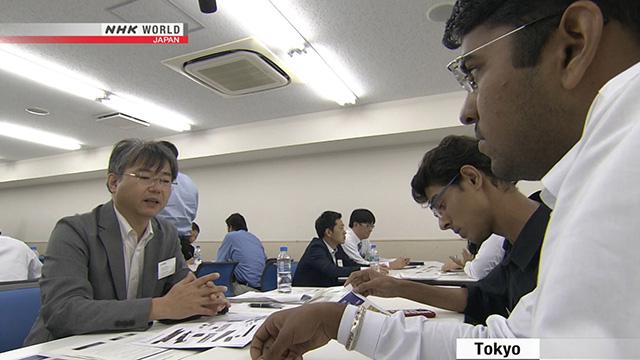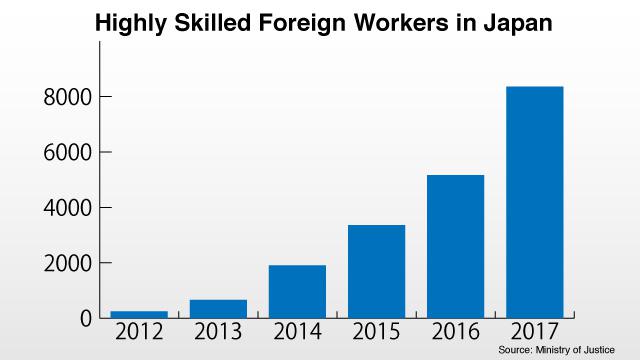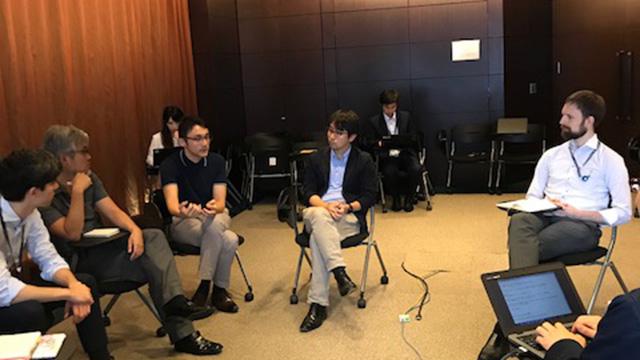Job fairs target Indian students

A recruiting seminar in Tokyo in September was aimed at matching Indian students with Japanese firms. Most of the students were studying information technology at universities in Japan. They listened intently to introductions by each company.
"We value Indian students because of their English skills and ability to think logically," said a recruiting manager at the seminar.

About 8,300 people from overseas were in high-skill jobs in banking and information technology in Japan as of the end of last year. That's a 33-fold increase over the past 6 years and the Japanese government wants to see more. It expects to raise that number to 20,000 by 2022 as domestic companies vie for capable employees in a tight labor market.
The value of Indian workers
A Tokyo-based developer of systems for accounting and corporate personnel says he's hiring Indian workers. One of them is 24-year-old Shubham Baldava. He studied systems development for four years in the information engineering department at an Indian university. He is now leading a team managing systems on internet servers.
His manager, Seiichiro Inoue, said that despite the high business demand, not enough young people are studying database and AI development. "Even if we hire Japanese students, it takes at least 3 years to fully train them," he said. "Indian students with knowledge and specialized skills acquired in college are extremely useful."

Securing skilled workers
Companies are using a variety of strategies to secure skilled personnel. India's recruitment system is unique. Most national universities with engineering departments take the initiative to help their students find jobs. They decide which companies can do interviews and they are conducted simultaneously in one place. Once a student accepts a job offer, they can't continue interviewing with other companies. The interview period is typically two weeks long. During that time, IT firms rush in from around the world to recruit. They know they have to get in quick to secure promising employees.
One recruiter at the company told us they used to hire through an agent. They now go directly to the universities' employment bureaus. "We were able to build a relationship of trust with university officials through these visits, and they started letting us interview students on the first day," he said. "Since then, we've been able to secure excellent personnel. It's costly, but worth it in the long run."
Adjusting to Different Needs
The firm is tackling another problem. Almost half of their Indian workers tend to quit within 5 years. The company believes this is due to the communication barrier. The office in Tokyo introduced a system for sharing information using chat tools and task management applications, but sometimes employees need to meet in person and discuss matters in detail.
"I feel the language barrier from time to time, said Shubham. "To avoid miscommunication, I often need a middle man who speaks English."

The company has been trying to improve this situation by helping Japanese staff improve their English. The lessons have business management themes and include practical terms and expressions. The company launched a program this year where employees study English in teams of 4. The teams earn points in a variety of ways, such as making presentations in English. A prize is awarded to the team with the most points. While participation in the program is voluntary, 500 employees have joined in the past 6 months.
"About 80 percent of the workers in my division don't speak Japanese," said one of the participants. "I joined the program because I felt I needed to improve my English. I've never attended an English school, but I've noticed recently that I don't get nervous when I talk with foreign colleagues in English."
The biggest challenge
The biggest obstacle to securing highly-skilled workers is Japan's wage and promotion system.

The IT firm we looked at offers a starting salary to its Indian workers equivalent to about 53,000 dollars a year. That's more than double the average starting wage for Japanese.
Japan's IT firms still set salaries on the basis of work experience. Firms in the US and Europe, however, increasingly set wages according to the nature of the work.
The time it takes Japanese companies to adjust to these differences could put them behind in the high-stakes scramble for talented workers.

